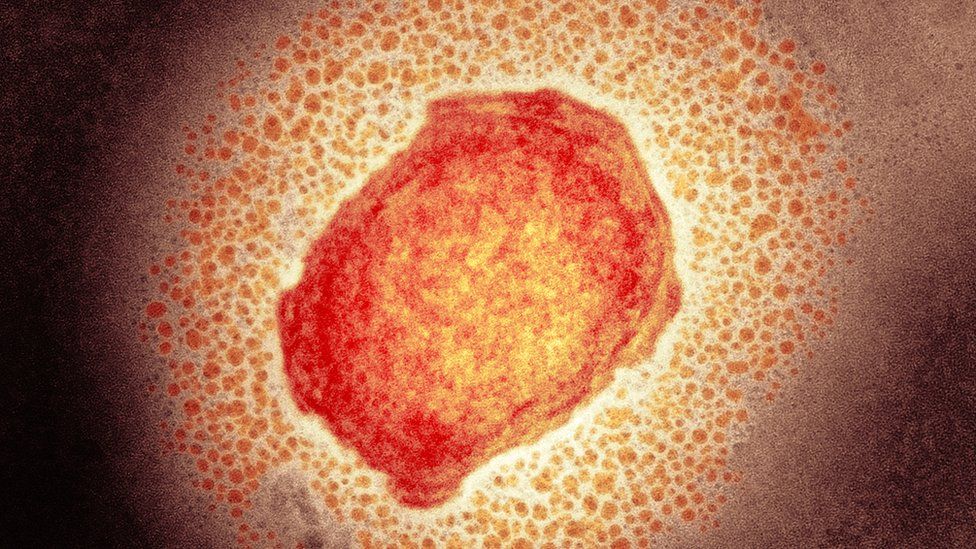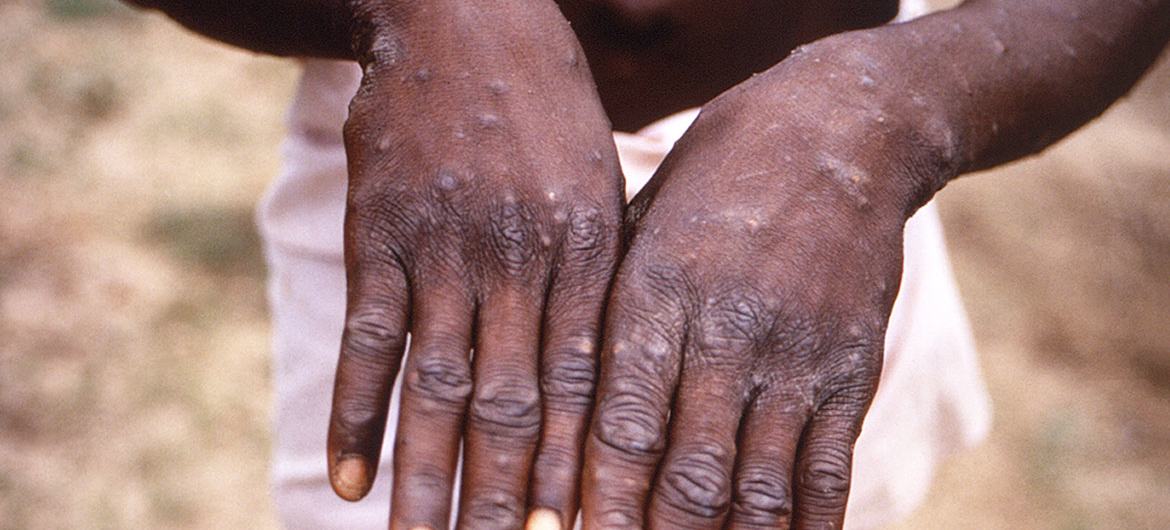What is monkeypox and how do you catch it?
5429
Monkeypox is a relative of smallpox, a disease that was eradicated in 1980, but is less transmissible, causes milder symptoms and is less deadly.

How common is monkeypox?
Monkeypox is caused by the monkeypox virus, a member of the same family of viruses as smallpox, although it is much less severe and experts say chances of infection are low. It occurs mostly in remote parts of central and west African countries, near tropical rainforests and there are two main strains of virus - west African and central African.
What are the symptoms of monkeypox?
Monkeypox is a relative of smallpox, a disease that was eradicated in 1980, but is less transmissible, causes milder symptoms and is less deadly.
The illness typically lasts for two to four weeks and symptoms can appear anywhere from five to 21 days after infection.
Monkeypox symptoms usually begin with a mix of fever, headaches, muscle aches, backache, chills, exhaustion, and swollen lymph nodes.
This latter symptom is typically what helps doctors distinguish monkeypox from chickenpox or smallpox, according to the World Health Organization (WHO).
Once you have a fever, the key feature of monkeypox, a nasty rash, tends to develop one to three days later, often starting on the face and then spreading to other parts of the body.
The number of lesions may range from a few to thousands.
The lesions will go through an ugly ripening process, from macules (flat lesions) to papules (raised lesions), vesicles (fluid-filled lesions), then pustules (pus-filled lesions) and then finally scabs (crusty lesions) before eventually falling off
Once you have a fever, the key feature of monkeypox, a nasty rash, tends to develop one to three days later, often starting on the face and then spreading to other parts of the body.
The number of lesions may range from a few to thousands.
The lesions will go through an ugly ripening process, from macules (flat lesions) to papules (raised lesions), vesicles (fluid-filled lesions), then pustules (pus-filled lesions) and then finally scabs (crusty lesions) before eventually falling off
How do you catch monkeypox?
You can catch the virus from the bite or scratch of an infected animal, by eating bush meat, being in direct contact with an infected human or touching contaminated bedding or clothing.
The virus enters the body through skin lesions, the respiratory tract, or the mucous membranes (the eyes, nose, or mouth).
Human-to-human transmission is thought to occur primarily through large respiratory droplets, which generally cannot travel more than a few feet, so prolonged face-to-face contact would be needed.
Some British experts commenting on the recent UK outbreak said it was soon to conclude that monkeypox had spread through sexual contact, but that it was a possibility.
The virus enters the body through skin lesions, the respiratory tract, or the mucous membranes (the eyes, nose, or mouth).
Human-to-human transmission is thought to occur primarily through large respiratory droplets, which generally cannot travel more than a few feet, so prolonged face-to-face contact would be needed.
Some British experts commenting on the recent UK outbreak said it was soon to conclude that monkeypox had spread through sexual contact, but that it was a possibility.
Add us on Line and stay in touch.
How dangerous is it?
Most cases of the virus are mild, sometimes resembling chickenpox, and clear up on their own within a few weeks.
Monkeypox can sometimes be more severe, however, and has been reported to have caused deaths in west Africa.
Monkeypox can sometimes be more severe, however, and has been reported to have caused deaths in west Africa.
Are gay men at greater risk?
Although some of the cases have been seen in gay and bisexual men, anyone who comes into close contact with someone who has monkeypox could potentially get the virus.
The UK Health Security Agency has said "a notable proportion" of the recent cases in the UK and Europe have been found in gay and bisexual men "so we are particularly encouraging them to be alert to the symptoms and seek help if concerned".
The UK Health Security Agency has said "a notable proportion" of the recent cases in the UK and Europe have been found in gay and bisexual men "so we are particularly encouraging them to be alert to the symptoms and seek help if concerned".
What is the treatment?
There is no treatment for monkeypox, but outbreaks can be controlled by infection prevention.
Vaccination against smallpox has been proven to be 85% effective in preventing monkeypox.
The UK has bought doses of the smallpox vaccine, but it is not clear how many jabs might be given.
Antiviral drugs may also help.
Vaccination against smallpox has been proven to be 85% effective in preventing monkeypox.
The UK has bought doses of the smallpox vaccine, but it is not clear how many jabs might be given.
Antiviral drugs may also help.
Should I be worried?
Monkeypox “is usually a mild self-limiting illness and most people recover within a few weeks,” the UKHSA said in its statement.
“It is important to emphasise that monkeypox does not spread easily between people and the overall risk to the general public is very low,” said Dr Colin Brown, the agency’s director of clinical and emerging infections.
The patients infected in England contracted the West African clade of the virus, which health officials say is mild compared to the Central African clade and has a case fatality ratio of around 1 per cent.
Although its symptoms are milder than those of smallpox, monkeypox has been shown to cause death in as many as 10 per cent of patients infected with the Congo Basin clade, compared to about 30 per cent for smallpox, according to WHO data.
Mortality is higher among children and young adults, and immunocompromised individuals are especially at risk of severe disease.
Monkeypox during pregnancy may also lead to complications, congenital monkeypox, or stillbirth, the WHO warned on Monday.
"Milder cases of monkeypox may go undetected and represent a risk of person-to-person transmission," it said in a statement.
“It is important to emphasise that monkeypox does not spread easily between people and the overall risk to the general public is very low,” said Dr Colin Brown, the agency’s director of clinical and emerging infections.
The patients infected in England contracted the West African clade of the virus, which health officials say is mild compared to the Central African clade and has a case fatality ratio of around 1 per cent.
Although its symptoms are milder than those of smallpox, monkeypox has been shown to cause death in as many as 10 per cent of patients infected with the Congo Basin clade, compared to about 30 per cent for smallpox, according to WHO data.
Mortality is higher among children and young adults, and immunocompromised individuals are especially at risk of severe disease.
Monkeypox during pregnancy may also lead to complications, congenital monkeypox, or stillbirth, the WHO warned on Monday.
"Milder cases of monkeypox may go undetected and represent a risk of person-to-person transmission," it said in a statement.
Treatment and prevention
Monkeypox usually goes away on its own, but an oral antiviral drug called Tecovirimat was approved earlier this year in the European Union to treat smallpox, monkeypox and cowpox and it can limit the spread and severity of the disease.
Vaccination against smallpox is believed to be highly effective in preventing monkeypox, but because smallpox was declared eradicated more than 40 years ago, younger populations "no longer benefit from the protection afforded by prior smallpox vaccination programmes," says the WHO.
A newer vaccine developed by Bavarian Nordic for the prevention of both smallpox and monkeypox has been approved in the European Union, the United States, and Canada (under the trade names Imvanex, Jynneos and Imvamune), but it's not yet widely available.
Common household disinfectants can kill the monkeypox virus, says the CDC.
Vaccination against smallpox is believed to be highly effective in preventing monkeypox, but because smallpox was declared eradicated more than 40 years ago, younger populations "no longer benefit from the protection afforded by prior smallpox vaccination programmes," says the WHO.
A newer vaccine developed by Bavarian Nordic for the prevention of both smallpox and monkeypox has been approved in the European Union, the United States, and Canada (under the trade names Imvanex, Jynneos and Imvamune), but it's not yet widely available.
Common household disinfectants can kill the monkeypox virus, says the CDC.
Trust PULSE CLINIC to take care of your health like other 45000 people from over 130 countries. We provide discreet professional service with high privacy. Here to help, not to judge.



